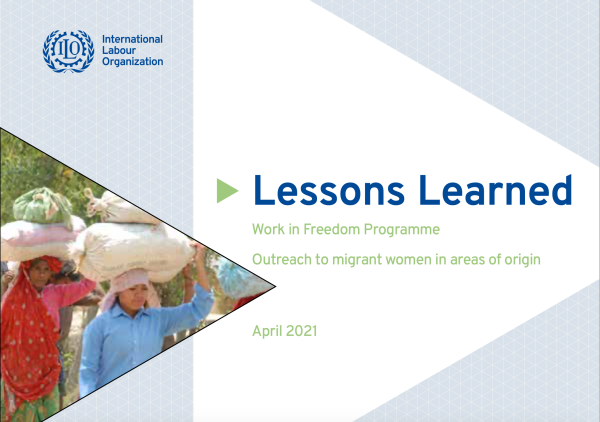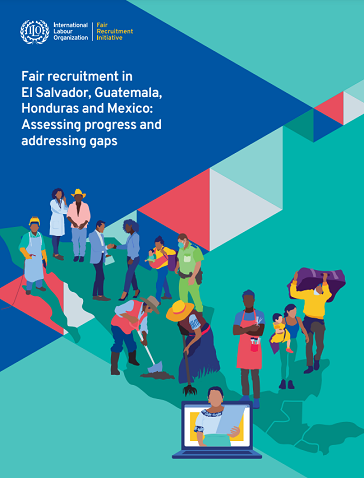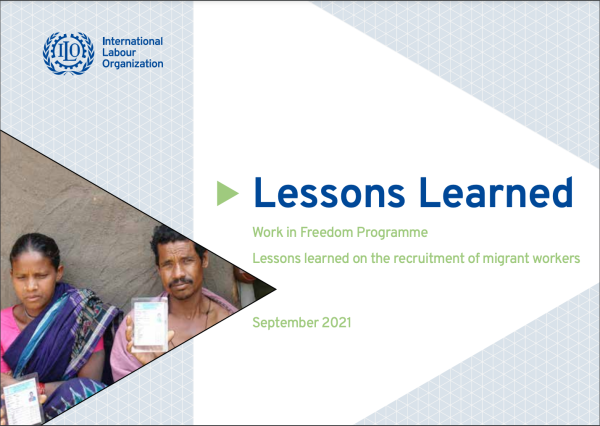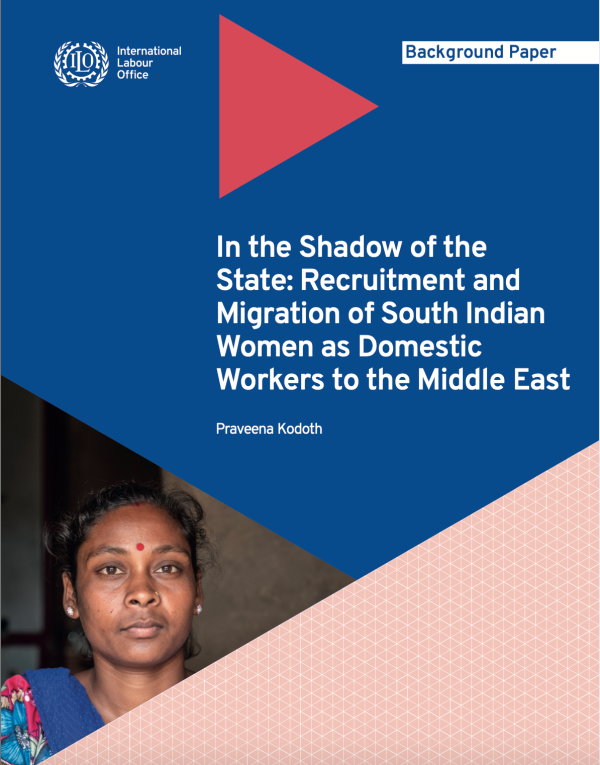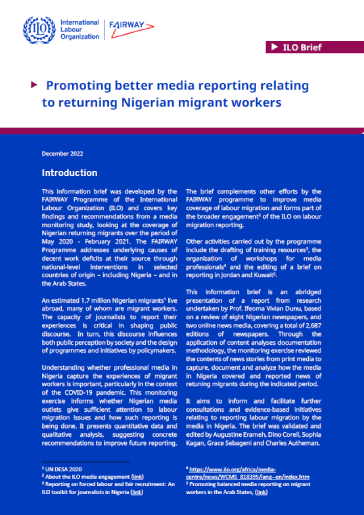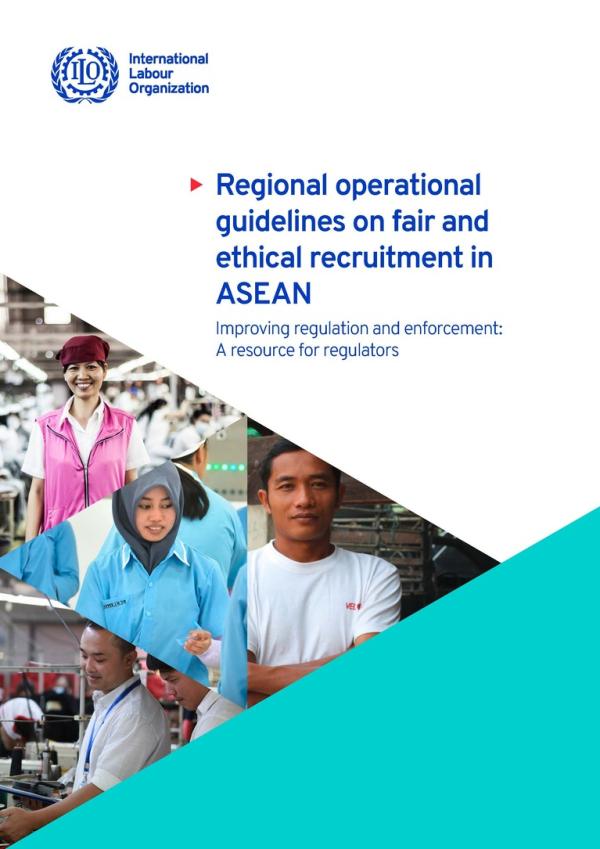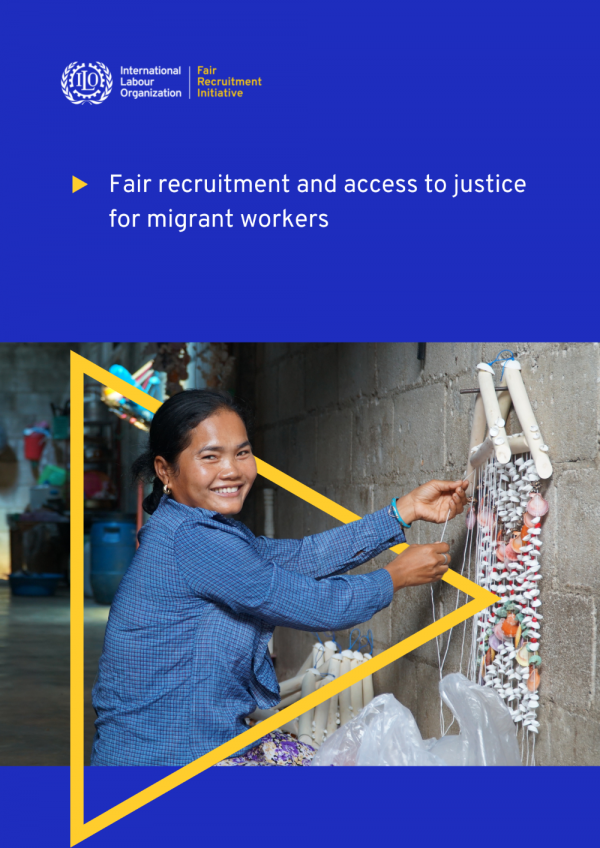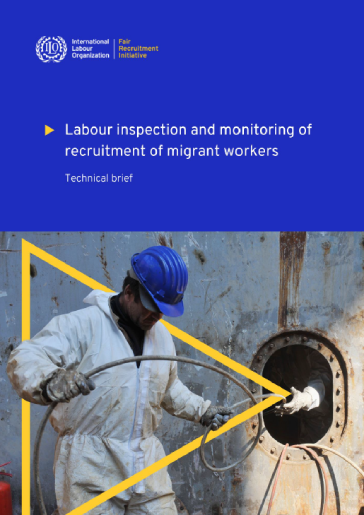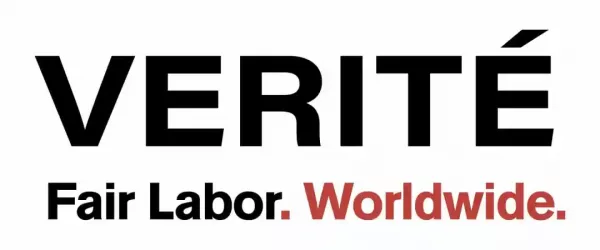Lessons Learned Part 1: Outreach to migrant women in areas of origin
This document describes the lessons learned by the Work in Freedom programme on outreach to migrant women in areas where they migrate from. This compilation was preceded by an earlier edition of Lessons Learned in October 2017, followed by another one in February 2019. The findings are important to inform Governments, donors and civil society groups on their policies regarding the protection of migrant women, safe migration, pre-departure training and orientation and more.
Type of document :
Country/Region : , , , , , ,
Year of publication :
Theme : , ,
Fair recruitment in El Salvador, Guatemala, Honduras and Mexico: Assessing progress and addressing gaps
Analysis of progress and gaps in the regulatory framework, policies and enforcement on fair recruitment in the region and in each country, with recommendations to address regional and national challenges.
The document also compiles cases, good practices and recent efforts in various sectors and regions at local and international level by governments, employers' organisations and workers' organisations.
Type of document :
Country/Region : , , , ,
Year of publication :
Theme : , ,
Lessons Learned Part 2: Recruitment
This document describes the lessons learned by the Work in Freedom programme on recruitment of migrant workers. This compilation was preceded by an earlier edition of Lessons Learned in October 2017, followed by another one in February 2019. This new edition focuses particularly on recruitment of migrant workers. It lists and describes the nature of both conventional and non-conventional interventions and reviews some of the assumptions behind the rationale for these interventions.
Type of document :
Country/Region : , , , , , ,
Year of publication :
Theme : , ,
In the Shadow of the State: Recruitment and Migration of South Indian Women as Domestic Workers to the Middle East
This background paper describes and analyses the drivers, pathways and experiences of migrant women from South India as domestic workers in Gulf countries. It is based on primary and secondary research.
Type of document :
Country/Region : , , , ,
Year of publication :
Theme : , , , , ,
Promoting better media reporting relating to returning Nigerian migrant workers
This information brief was developed by the FAIRWAY Programme of the International Labour Organization (ILO) and covers key findings and recommendations from a media monitoring study, looking at the coverage of Nigerian returning migrants over the period of May 2020 - February 2021.
Type of document :
Country/Region :
Year of publication :
Theme : , ,
Regional operational guidelines on fair and ethical recruitment in ASEAN. Improving regulation and enforcement: A resource for regulators
The regional operational guidelines provide guidance to government regulators on fair recruitment practices, licensing private recruitment agencies, monitoring recruitment processes, and acting on complaints related to the recruitment process. Developed within the framework of the ILO general principles and operational guidelines for fair recruitment, these regional operational guidelines are relevant to both countries of origin and destination.
Labour migration plays an important role in fostering economic and social development in the ASEAN region. Fair and ethical recruitment can protect migrant workers from experiencing labour rights’ violations, including trafficking and forced labour. However, recruitment is often an imperfect process, characterized by fraudulent and exploitative practices. These imperfections have been particularly damaging to the interest of workers seeking jobs across national borders.
The new ILO regional operational guidelines on fair and ethical recruitment provide guidance on licensing of private recruitment agencies, the monitoring of recruitment processes, effective inspection and enforcement mechanisms, and acting on complaints. The regional operational guidelines have been developed as a practical resource for regulators in the ASEAN region and are intended to apply to both countries of origin, and destination, depending on the context.
Type of document :
Country/Region : , , , , , , , , , ,
Year of publication :
Theme : , ,
Fair recruitment and access to justice for migrant workers
Over 169 million men and women today live and work outside their country of origin in pursuit of decent work and better livelihoods. Public employment services and private employment agencies, when appropriately regulated, play an important role in the efficient and equitable functioning of labour markets by matching available jobs with suitably qualified workers. However, it is during the recruitment phase that migrant workers, especially low-wage workers, are particularly at risk of entering a cycle of abuse and exploitation.
Access to justice is central to making human rights, including labour rights, a reality for all workers and individuals. It is premised upon the central tenet of non-discrimination – that every person is entitled, without discrimination and on an equal basis with others, to equal treatment and protection under the law.1 In addition, a number of international Conventions and instruments guarantee the right to a fair and public hearing and process2 as well as the right to an effective remedy.3 For a remedy to be considered effective, it must:
• be accessible, affordable, adequate and timely;
• combine preventive, redressive and deterrent elements; and
• include the right to be treated “equally in all stages of procedure”, regardless of personal characteristics such as gender, race, or ethnicity, among others.
To this end, this working paper focuses on good practices concerning the migrant workers’ right to access to justice in the context of their labour recruitment, where recruitment is understood to include the advertising, information dissemination, selection, transport, placement into employment and – for migrant workers – return to the country of origin where applicable. The paper first gives an overview of current gaps in rights protection throughout the labour migration cycle and then outlines the sources of the right to access to justice under international human rights law, international labour standards and instruments, bilateral agreements, and the UN Guiding Principles on Business and Human Rights (UNGPs). It also briefly sets out the processes that may be available for seeking redress, as well as the structural factors that obstruct migrant workers from accessing these processes and provides examples of good practices from around the world that are constructively addressing these barriers to accessing justice.
Type of document :
Country/Region :
Year of publication :
Theme : , ,
Labour inspection and monitoring of recruitment of migrant workers
With a view towards contributing to achieving fair recruitment of migrant workers, this paper offers an overview of the main challenges pertaining to monitoring of recruitment of migrant workers by labour inspectorates, along with suggested ways forward and pointers for possible action by the ILO.
Labour inspection responsibilities extend to all stages of the recruitment process. The ILO General Principle for Fair Recruitment 5 states that “Regulation of employment and recruitment activities should be clear and transparent and effectively enforced. The role of the labour inspectorate and the use of standardized registration, licensing or certification systems should be highlighted.” Furthermore, Operational Guideline 5.1 outlining the responsibilities of governments indicates that: "Governments should work to ensure that there is an effective and sufficiently resourced labour inspectorate, and that it is empowered and trained to investigate and intervene at all stages of the recruitment process for all workers and all enterprises, and to monitor and evaluate the operations of all labour recruiters.” However, inspection of recruitment processes remains challenging – leaving many vulnerable workers (including migrant workers and those in the informal economy), exposed to exploitation and abuse.
In order to further expand knowledge and advocacy on the role of the labour inspectorate in ensuring fair recruitment, the ILO Labour Migration branch and the Labour Administration, Labour Inspection and Occupational Safety and Health branch commissioned a brief on fair recruitment and labour inspection, with the contribution of several projects (EU-REFRAME, SDC-FAIR II and SIDA-JLMP).
Type of document :
Country/Region :
Year of publication :
Theme : , ,
Verité’s Work Supporting Safe, Fair, and Legal Recruitment for Workers
Verité performs research and develops tools, guidance and approaches to support responsible recruitment and hiring.
Type of document :
Country/Region :
Year of publication :
Theme :
Verité’s CUMULUS Forced Labor Screen™
Verité’s CUMULUS Forced Labor Screen™ maps labor supply chains using patent-pending technology to gather data on workforces, recruiters, and unethical recruitment and employment practices. The membership-based platform proactively screens priority operations, supply chains, and investment portfolios for the presence of the International Labour Organization (ILO) forced labor indicators.
Type of document :
Country/Region :
Year of publication :
Theme :
Subscribe to the Fair Recruitment Initiative Newsletter
Sign up to receive news delivered to your inbox.

